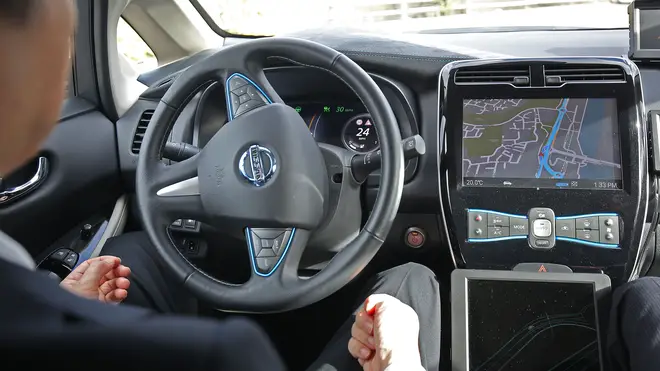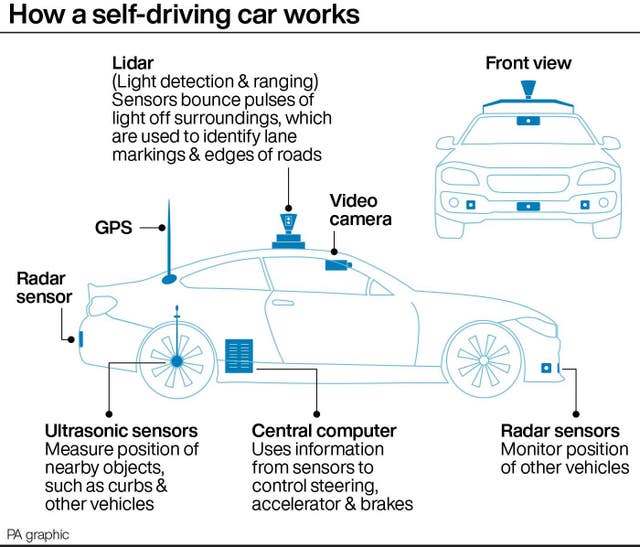
Jim Diamond 1am - 4am
28 April 2021, 13:14

The Government will allow hands-free driving in vehicles with lane-keeping technology on motorways with slow traffic.
Self-driving cars enabling drivers to take their eyes off the road and their hands off the wheel could be permitted on UK motorways later this year.
The Department for Transport (DfT) announced it will allow hands-free driving in vehicles with lane-keeping technology on motorways with slow traffic, at speeds of up to 37mph.
It has set out how a vehicle with an automated lane keeping system (ALKS) could legally be used by a driver not paying attention, as long as there is no evidence to “challenge the ability” of it to be used autonomously.
ALKS enables a motorist to hand over control to their vehicle, although they must be available to resume the driving task.
It is designed to constantly monitor speed and keep a safe distance from other road users, normally through the use of cameras and sensors.
The DfT describes ALKS as “traffic jam chauffeur technology”.
In the event the system detects an “imminent collision risk”, it will carry out an “emergency manoeuvre” which could involve braking or a change of direction.
The DfT claimed the technology could boost road safety as human error “contributes to over 85% of accidents”.
A consultation has been launched on updates to the Highway Code to ensure autonomous systems are used safely and responsibly.

Transport minister Rachel Maclean said: “This is a major step for the safe use of self-driving vehicles in the UK, making future journeys greener, easier and more reliable while also helping the nation to build back better.
“But we must ensure that this exciting new tech is deployed safely, which is why we are consulting on what the rules to enable this should look like.
“In doing so, we can improve transport for all, securing the UK’s place as a global science superpower.”
Jim Holder, editorial director of magazine and website What Car?, said the new policy is a “sensible first step” towards autonomous driving.
“These are very, very controlled circumstances, low speed, relatively straight roads, clear road markings,” he told the PA news agency.
“In theory this should be a very effective way of using the technology to good effect.”
He said the UK is in a “global competition” to develop the technology.
The announcement “gets us back in the race” as the UK is “a bit behind” the US and China, Mr Holder added.
Steve Gooding, director of the RAC Foundation, said humans are “invariably the weak link” when it comes to driving safely, but he warned there are “challenges” when journeys involve a transfer of control between technology and the person behind the wheel.
“There is a risk of situations in which drivers over-rely on the automated system, expecting it to deal with events for which it is neither intended nor capable.
“And what happens when drivers are expected to take back control in an emergency? Research for us shows that it can take drivers several seconds to regain command of their vehicle.”
Mike Hawes, chief executive of the Society of Motor Manufacturers and Traders, said: “Technologies such as automated lane keeping systems will pave the way for higher levels of automation in future.
“These advances will unleash Britain’s potential to be a world leader in the development and use of these technologies, creating essential jobs while ensuring our roads remain among the safest on the planet.”
But AA president Edmund King claimed “we shouldn’t be in race to take drivers’ hands off the wheel”.
He went on: “There are still gaps in how this technology detects and stops if the vehicle is involved in a collision.
“There are still question marks over how drivers will be fully informed how these systems work.
“More needs to be done to rigorously test these systems before they are used on UK roads.”
Concerns about autonomous vehicles were raised when two men were killed on April 17 when a Tesla Model S crashed into a tree in Texas.
Police believe no-one was in the driver’s seat when the collision occurred.
Tesla’s Autopilot system enables a car to steer, accelerate and brake automatically within its lane, but currently requires active driver supervision.
Tesla boss Elon Musk wrote on Twitter that “data logs recovered so far show Autopilot was not enabled”.